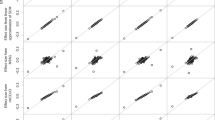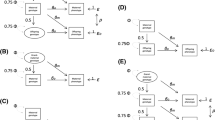Abstract
Indirect genetic effects from relatives may result in misleading quantifications of heritability, but can also be of interest in their own right. In this paper we propose Trio-GCTA, a model for separating direct and indirect genetic effects when genome-wide single nucleotide polymorphism data have been collected from parent-offspring trios. The model is applicable to phenotypes obtained from any of the family members. We discuss appropriate parameter interpretations and apply the method to three exemplar phenotypes: offspring birth weight, maternal relationship satisfaction, and paternal body-mass index, using real data from the Norwegian Mother, Father and Child Cohort Study (MoBa).
Similar content being viewed by others
Data availability
Not applicable.
Code availability
Code for estimating the model is available at https://github.com/espenmei/trio
References
Bates TC, Maher S, Medland SE, McAloney K, Wright MJ, Hansell NK, Kendler KS, Martin NG, Gillespie NA (2018) The nature of nurture: using a virtual-parent design to test parenting effects on children’s educational attainment in genotyped families. Twin Res Hum Genet 21(2):73–83
Bijma P (2014) The quantitative genetics of indirect genetic effects: a selective review of modelling issues. Heredity 112(1):61–69
Dyrdal GM, Røysamb E, Nes RB, Vittersø J (2011) Can a happy relationship predict a happy life? A populationbased study of maternal well-being during the life transition of pregnancy, infancy, and toddlerhood. J Happiness Stud 12(6):947–962
Eaves LJ, Pourcain BS, Smith GD, York TP, Evans DM (2014) Resolving the effects of maternal and offspring genotype on dyadic outcomes in genome wide complex trait analysis (“M-GCTA”). Behav Genet 44(5):445–455
Elks CE, Den Hoed M, Zhao JH, Sharp SJ, Wareham NJ, Loos RJF, Ong KK (2012) Variability in the heritability of body mass index: a systematic review and metaregression. Front Endocrinol 3:29
Evans DM, Moen G-H, Hwang L-D, Lawlor DA, Warrington NM (2019) Elucidating the role of maternal environmental exposures on offspring health and disease using two-sample Mendelian randomization. Int J Epidemiol 48(3):861–875
Helgeland Ø, Vaudel M, Juliusson PB, Holmen OL, Juodakis J, Bacelis J, Jacobsson B, Lindekleiv H, Hveem K, Lie RT et al (2019) Genome-wide association study reveals dynamic role of genetic variation in infant and early childhood growth. Nat Commun 10(1):1–10
Kong A, Thorleifsson G, Frigge ML, Vilhjalmsson BJ, Young AI, Thorgeirsson TE, Benonisdottir S, Oddsson A, Halldorsson BV, Masson G et al (2018) The nature of nurture: effects of parental genotypes. Science 359(6374):424–428
Laurin C, Cuellar-Partida G, Hemani G, Smith GD, Yang J, Evans DM (2018) Partitioning phenotypic variance due to parent-of-origin effects using genomic relatedness matrices. Behav Genet 48(1):67–79
Lunde A, Melve KK, Gjessing HK, Skjærven R, Irgens LM (2007) Genetic and environmental in uences on birth weight, birth length, head circumference, and gestational age by use of population-based parent-offspring data. Am J Epidemiol 165(7):734–741
Lynch M, Walsh B et al (1998) Genetics and analysis of quantitative traits, vol 1. Sinauer, Sunderland
Maes HHM, Neale MC, Eaves LJ (1997) Genetic and environmental factors in relative body weight and human adiposity. Behav Genet 27(4):325–351
Magnus P (1984) Causes of variation in birth weight: a study of offspring of twins. Clin Genet 25(1):15–24
Magnus P, Birke C, Vejrup K, Haugan A, Alsaker E, Daltveit AK, Handal M, Haugen M, Høiseth G, Knudsen GP et al (2016) Cohort profile update: the Norwegian mother and child cohort study (MoBa). Int J Epidemiol 45(2):382–388
McAdam AG, Dany G, Wilson AJ (2014) The effects of others’ genes: maternal and other indirect genetic effects. Quant Genet Wild. https://doi.org/10.1093/acprof:oso/9780199674237.003.0006
McAdams TA, Neiderhiser JM, Rijsdijk FV, Narusyte J, Lichtenstein P, Eley TC (2014) Accounting for genetic and environmental confounds in associations between parent and child characteristics: a systematic review of children-of-twins studies. Psychol Bull 140(4):1138
Neale MCCL, Cardon LR (2013) Methodology for genetic studies of twins and families, vol 67. Springer, New York
Neale MC, Hunter MD, Pritikin JN, Zahery M, Brick TR, Kirkpatrick RM, Estabrook R, Bates TC, Maes HH, Boker SM (2016) OpenMx 2.0: extended structural equation and statistical modeling. Psychometrika 81(2):535–549. https://doi.org/10.1007/s11336-014-9435-8
Polderman TJC, Benyamin B, De Leeuw CA, Sullivan PF, Van Bochoven A, Visscher PM, Posthuma D (2015) Meta-analysis of the heritability of human traits based on fifty years of twin studies. Nat Genet 47(7):702
Qiao Z, Zheng J, Helgeland Ø, Vaudel M, Johansson S, Njølstad PR, Smith GD, Warrington NM, Evans DM (2020) Introducing M-GCTA a software package to estimate maternal (or paternal) genetic effects on offspring phenotypes. Behav Genet 50(1):51–66
R Core Team (2019) R: a language and environment for statistical computing. R Foundation for Statistical Computing, Vienna. https://www.R-project.org/
Røysamb E, Vittersø J, Tambs K (2014) The relationship satisfaction scale-psychometric properties
South SC, Krueger RF, Elkins IJ, Iacono WG, McGue M (2016) Romantic relationship satisfaction moderates the etiology of adult personality. Behav Genet 46(1):124–142
Visscher PM, Hemani G, Vinkhuyzen AAE, Chen G-B, Lee SH, Wray NR, Goddard ME, Yang J (2014) Statistical power to detect genetic (co) variance of complex traits using SNP data in unrelated samples. PLoS Genet. https://doi.org/10.1371/journal.pgen.1004269
Warrington NM, Beaumont RN, Horikoshi M, Day FR, Helgeland Ø, Laurin C, Bacelis J, Peng S, Hao K, Feenstra B et al (2019) Maternal and fetal genetic effects on birth weight and their relevance to cardio-metabolic risk factors. Nat Genet 51(5):804–814
Yang J, Bakshi A, Zhu Z, Hemani G, Vinkhuyzen AAE, Lee SH, Robinson MR, Perry JRB, Nolte IM, van Vliet-Ostaptchouk JV et al (2015) Genetic variance estimation with imputed variants finds negligible missing heritability for human height and body mass index. Nat Genet 47(10):1114
Yang J, Benyamin B, McEvoy BP, Gordon S, Henders AK, Nyholt DR, Madden PA, Heath AC, Martin NG, Montgomery GW et al (2010) Common SNPs explain a large proportion of the heritability for human height. Nat Genet 42(7):565
Yang J, Hong Lee S, Goddard ME, Visscher PM (2011) GCTA: a tool for genome-wide complex trait analysis. Am J Hum Genet 88(1):76–82
Yang J, Hong Lee S, Wray NR, Goddard ME, Visscher PM (2016) GCTA-GREML accounts for linkage disequilibrium when estimating genetic variance from genome-wide SNPs. Proc Natll Acad Sci 113(32):E4579–E4580
Yang J, Lee SH, Goddard ME, Visscher PM (2013) Genome-wide complex trait analysis (GCTA): methods, data analyses, and interpretations. Genome-wide association studies and genomic prediction. Springer, New York, pp 215–236
Yang J, Zeng J, Goddard ME, Wray NR, Visscher PM (2017) Concepts, estimation and interpretation of SNP-based heritability. Nat Genet 49(9):1304
York TP, Eaves LJ, Lichtenstein P, Neale MC, Svensson A, Latendresse S, Långström N, Strauss III JF (2013) Fetal and maternal genes’ in uence on gestational age in a quantitative genetic analysis of 244,000 Swedish births. Am J Epidemiol 178(4):543–550
York TP, Strauss JF, Neale MC, Eaves LJ (2009) Estimating fetal and maternal genetic contributions to premature birth from multiparous pregnancy histories of twins using MCMC and maximum-likelihood approaches. Twin Res Hum Genet 12(4):333–342
Young AI (2019) Solving the missing heritability problem. PLoS Genet 15(6):e1008222
Young AI, Benonisdottir S, Przeworski M, Kong A (2019) Deconstructing the sources of genotype–phenotype associations in humans. Science 365(6460):1396–1400
Young AI, Frigge ML, Gudbjartsson DF, Thorleifsson G, Bjornsdottir G, Sulem P, Masson G, Thorsteinsdottir U, Stefansson K, Kong A (2018) Relatedness disequilibrium regression estimates heritability without environmental bias. Nat Genet 50(9):1304–1310
Zhu Z, Bakshi A, Vinkhuyzen AAE, Hemani G, Lee SH, Nolte IM, van Vliet-Ostaptchouk JV, Snieder H, Esko T, Milani L et al (2015) Dominance genetic variation contributes little to the missing heritability for human complex traits. Am J Hum Genet 96(3):377–385
Acknowledgements
The Norwegian Mother, Father and Child Cohort Study is supported by the Norwegian Ministry of Health and Care Services and the Ministry of Education and Research. We are grateful to all the participating families in Norway who take part in this on-going cohort study. This publication is a part of the project “Intergenerational Transmission of Internalizing and Externalizing Psychopathological Spectra: A Genome-Wide Complex Trait Study” supported by the Research Council of Norway (262177). Espen Moen Eilertsen and Eivind Ystrom was supported by the Norwegian Research Council (262177 and 288083). Laurie Hannigan was supported by a grant from the South-Eastern Norway Regional Health Authority (2018059). Alexandra Havdahl was supported by the South-Eastern Norway Regional Health Authority (2018058 and 2020022). Tom A. McAdams was supported by a Sir Henry Dale Fellowship, jointly funded by the Wellcome Trust and the Royal Society (107706/Z/15/Z) and the Norwegian Research Council (288083). Eshim S. Jami was supported by the European Union’s Horizon 2020 research and innovation programme, Marie Sklodowska Curie Actions (721567). This work was partly supported by the Research Council of Norway through its Centres of Excellence funding scheme, project number 262700. We thank the Norwegian Institute of Public Health (NIPH) for generating high-quality genomic data. This research is part of the HARVEST collaboration, supported by the Research Council of Norway (229624). We further thank the Center for Diabetes Research, the University of Bergen for providing genotype data and performing quality control and imputation of the data funded by the ERC AdG project SELECTionPREDISPOSED, Stiftelsen Kristian Gerhard Jebsen, Trond Mohn Foundation, the Research Council of Norway, the Novo Nordisk Foundation, the University of Bergen, and the Western Norway health Authorities (Helse Vest).
Author information
Authors and Affiliations
Corresponding author
Ethics declarations
Conflict of interest
Espen Moen Eilertsen, Eshim Shahid Jami, Tom A. McAdams, Laurie J. Hannigan, Alexandra S. Havdahl, Per Magnus, David M. Evans, and Eivind Ystrom declare that they have no conflict of interest.
Human and Animal Rights
This study was performed in line with the principles of the Declaration of Helsinki. Approval was granted by the Regional Committee for Medical Research Ethics.
Informed Consent
Informed consent was obtained from all individual participants included in the study.
Consent for publication
Not applicable.
Additional information
Publisher's Note
Springer Nature remains neutral with regard to jurisdictional claims in published maps and institutional affiliations.
Edited by Stacey Cherny.
Electronic supplementary material
Below is the link to the electronic supplementary material.
Rights and permissions
About this article
Cite this article
Eilertsen, E.M., Jami, E.S., McAdams, T.A. et al. Direct and Indirect Effects of Maternal, Paternal, and Offspring Genotypes: Trio-GCTA. Behav Genet 51, 154–161 (2021). https://doi.org/10.1007/s10519-020-10036-6
Received:
Accepted:
Published:
Issue Date:
DOI: https://doi.org/10.1007/s10519-020-10036-6




